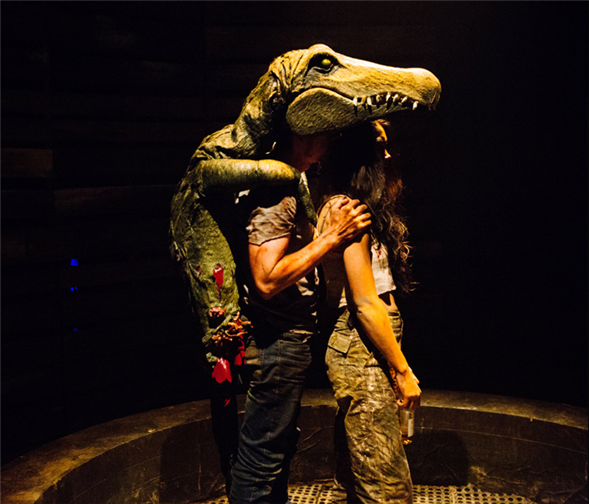Wrestling With Alligators (and Yourself)
Home > TDF Stages > Wrestling With Alligators (and Yourself)

A new play finds drama in the Everglades
—
Hilary Bettis remembers the long nights she spent years ago with her now-ex boyfriend at rock clubs in Brooklyn and the East Village. She felt “that visceral experience of live music and community” was missing from her theatre life.
“I really wanted to find a way to write a play that my friends who weren’t involved in the theatre would want to go see,” she says.
Soon enough, she started work on Alligator, which New Georges is presenting through December 18 at the A.R.T/NY Theatres. The play follows twin orphans who wrestle gators for a living at a tourist trap in the Florida Everglades, and from the beginning, Bettis knew she wanted it to have the rawness, heat, and “organic spontaneity” of her rock-n-roll nights.
“I wrote it as if it were a fever dream,” Bettis says. “The alligator, the boys in the car, the raccoon – [they] all came out of nowhere. I was experiencing what people in the play were experiencing as I was writing it, as opposed to sitting back and planning what these people were going to do.”
But while she may not have known where there plot was going, she definitely knew when the emotions were accurate. “It had just enough fiction and theatricality to hide what is a very personal and, in many ways, autobiographical story,” she says. “I was living with an alcoholic and dealing with alcohol myself. A close friend who was my mentor and advocate, who taught me everything about writing, was dying of cancer, and he didn’t have any family. I became the person caring for him. I was dealing with death and poverty and alcoholism, no furniture, my whole family getting laid off…”
It wasn’t until last summer, however, that Bettis visited the Everglades. She returned “with an even deeper appreciation, respect, and reverence for that environment and that part of the world.”
And for alligators, too.
“I saw them as these incredible beautiful and really misunderstood creatures,” she says. “This part of the world is so misunderstood, too. The Everglades is beautiful but also so brutal: it’s hot, humid, full of mosquitoes, pythons, anacondas, and other wild, wild creatures. It’s a place where everything is trying to kill you in some way, shape, or form. The people who call this place home have to have survival skills that most of us take for granted. They live by instincts, and they’re quick on their feet. They understand the consequence of life and death in a way we don’t because in order to survive they have to be willing to kill something that might kill them.”
Bettis adds that she constantly grapples with matters of place, home, and identity. Discussing her own ancestry, she asks, “How do you define what it means to be Latina in a country full of immigrants with a mix of backgrounds?”
Bettis, whose mother is half Mexican and whose father is a minister from South Carolina, is drawn to a family history that was purposefully obscured by her grandfather.
“He came up from Mexico, and his ability to survive in this country meant being more American than Americans, speaking perfect English without an accent, joining the military, being incredibly law- abiding and productive members of society,” she says. “For him, his biggest fear was that I would be too dark and held back from opportunities.”
As her family moved around, she found herself in rural white communities “where they would say, ‘Oh, you’re Latina.'” And then she would find herself in the Chicano neighborhoods of Los Angeles, where the locals would say, “Oh, you’re not Latina.”
“Yet I am all these things,” Bettis says. “It’s in my blood, in my DNA. Now in 2016 I am able to say, ‘No, I am not letting the world define my identity. I’ll define and reclaim that identify for my family as much as myself.'”
It matters, then, that New Georges is producing Alligators in conjunction with the Sol Project, which specifically supports productions by Latina/o playwrights. As Bettis says, “For the Sol Project to reach out to me to say, ‘You are a member of [this] community, and we want to recognize that and put your play up in New York City,’ well that’s a validation. There is a community that says I am part of them.”
—
Follow Frank Rizzo at @ShowRiz. Follow TDF at @TDFNYC.
Photos by Heather Phelps-Lipton. Top photo: Bobby Moreno and Lindsay Rico.
TDF Members: At press time, discount tickets were available for ‘Alligator.’ Go here to browse our current offers.
